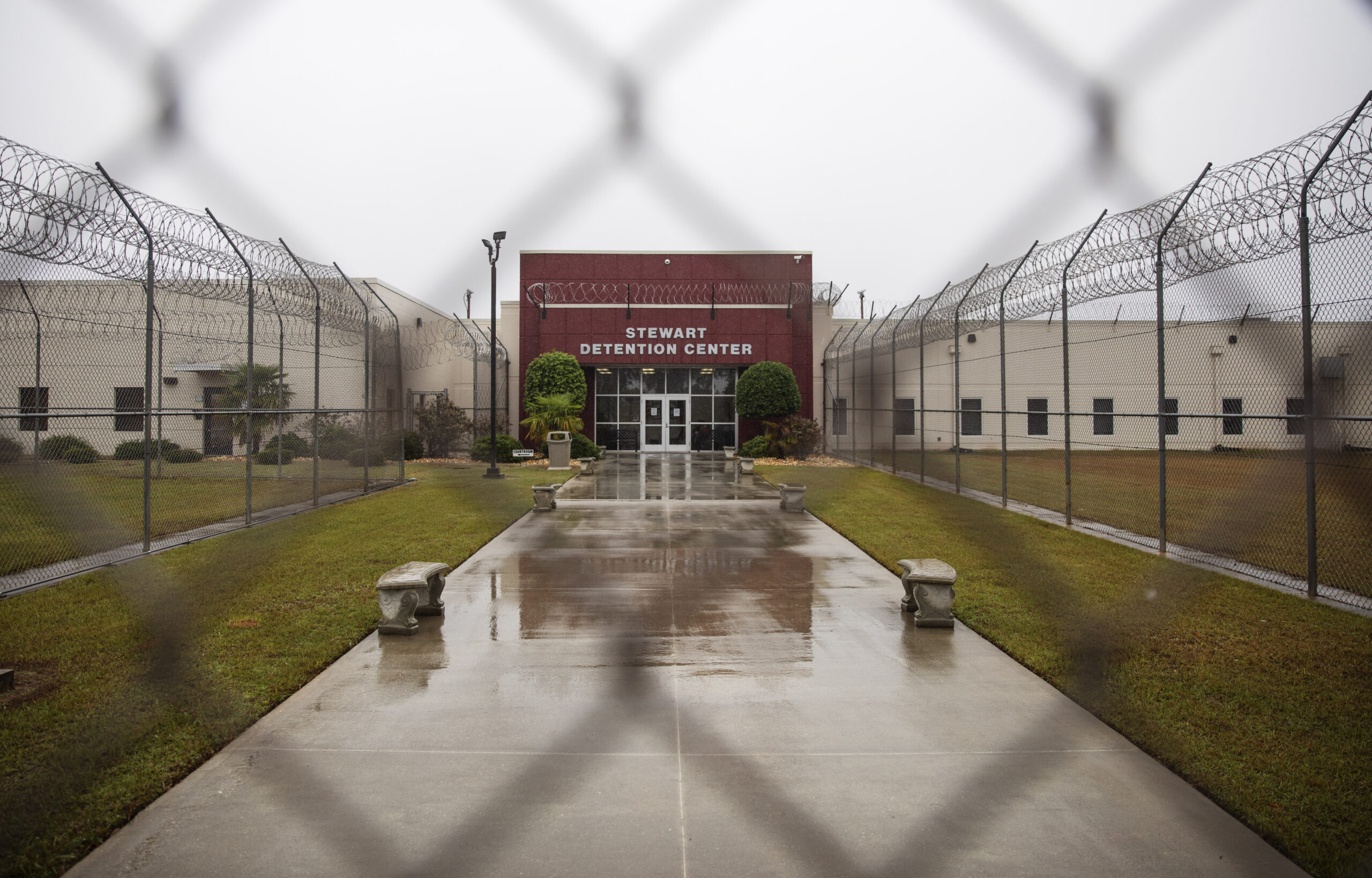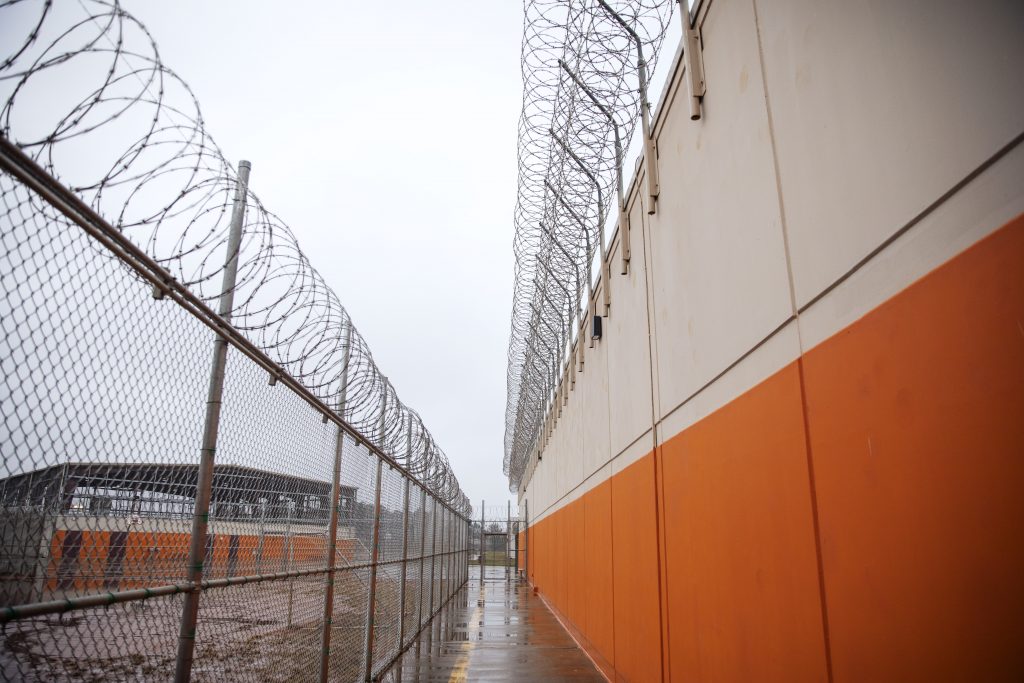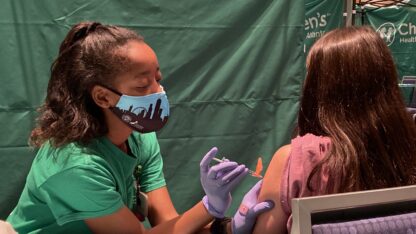COVID-19 Cases, Complaints Prompt Advocates To Seek Investigation Of Georgia ICE Facility

Immigrant rights groups are asking Georgia’s house delegates to join Senators Raphael Warnock and Jon Ossoff in asking the Department of Homeland Security to investigate sexual assault accusations against Stewart Detention Center personnel.
David Goldman / Associated PRess file
Roberto was only in the Stewart Detention Center for less than a couple of months, but he got COVID-19.
“I couldn’t breathe. I lost my sense of smell, my sense of taste. My chest was hurting,” he says. “I felt like I was gonna get a heart attack. I was afraid to fall asleep.”
He said while he was at Stewart earlier this year he was given masks, but inconsistently. And a lack of social distancing made it difficult to abide by health guidelines.
He wants to be called Roberto as his immigration status is pending. He lost his residency status after a drug charge landed him in prison. After serving his time, he was detained by immigration officials for more than a year.
Roberto’s experience with COVID-19 at Stewart coincides with a new report released Tuesday by advocates about conditions at the facility during the pandemic.
Those detained at Stewart say the facility hasn’t taken proper precautions to prevent the spread of COVID-19.
And they want federal agencies to investigate.
According to the report from the organization El Refugio, which coordinates care for those in custody at Stewart, immigrants at the facility are not receiving regular testing or personal protective equipment and medical treatment for COVID-19 is often delayed.
The report also says that solitary confinement has been used to quarantine people.
Roberto said he was isolated in solitary confinement for four days when he had COVID-19 symptoms.
Advocates also highlight that Stewart has had longstanding issues with medical neglect.
For example, a 2017 report by the Department of Homeland Security Office of Inspector General showed long waits for medical care at the facility as well as a lack of cleanliness and basic hygienic supplies.
Amilcar Valencia, executive director of El Refugio, says medical neglect has been exacerbated during the pandemic and that those in Stewart are worried about their health.
“The fear is clear. And overall fear of dying in detention,” says Valencia.
Nine people have died in U.S. Immigration and Customs Enforcement custody during the pandemic due to COVID-19. Four of those deaths were at Stewart, according to data from ICE. That’s the most of any immigration detention facility in the country.
The El Refugio report, called Cage of Fear, is based on more than 400 calls to both El Refugio’s and Freedom for Immigrants’ detention hotlines as well as letters written by people detained at Stewart documenting their experience during the pandemic.
Savannah Lengnick, a visitation coordinator at El Refugio, says calls to the hotline about COVID-19 began as soon as a pandemic was declared in March 2020.
“It’s been very consistent reports about people only receiving a clean mask every two weeks,” Lengnick says about the calls. “Or on one occasion, somebody calling us to ask us if we can send a clean mask.”
An ICE spokesperson did not respond to specifics about Stewart but said in a statement that ICE ensures that those in custody are safe.
When asked if ICE puts those in custody with COVID-19 symptoms in solitary confinement, a spokesperson directed WABE to the agency’s detention standards, which says a person in custody can be placed in “administrative segregation” for medical reasons.

Valencia says though the report focuses on Stewart, the problems extend to other ICE facilities in Georgia.
“People who are detained at Stewart, people who are detained at Irwin, people who continue to be detained at Folkston, people who are detained at other detention centers are day by day experiencing these abuses,” he says.
Advocates are calling for people in ICE custody to be released. In addition to the health risks, they say that detaining people is a waste to taxpayer money. According to federal data, there are nearly 17,000 people detained by ICE. That’s the lowest it’s been in decades.
Last week, advocates and immigrants affected by conditions at Stewart called on President Joe Biden to close down private detention centers.
Matt Boles is an attorney with the Southern Poverty Law Center’s Southeast Immigrant Freedom Initiative. He works with immigrants at Stewart and describes what people are experiencing at the facility during the pandemic as “incredibly dire.”
Stewart is in the rural town of Lumpkin in southwest Georgia. Not only does the town lack legal services but its remote location means it’s isolated from emergency medical care.
“Even getting medical care for anything, not just COVID-related, is pretty far away,” says Boles.
He says the closest hospital was in Cuthbert, about 20 miles away. But the Southwest Georgia Regional Medical Center closed last year due to financial trouble. Now, the nearest hospitals in Georgia to Stewart are in Columbus or Americus, both nearly 40 miles away. Boles says there’s also an option to go to Alabama for emergency medical care in Eufaula, which is about 30 miles away.
Boles, along with other advocates, say ICE detention centers should be shut down.
As for Roberto, he says he hasn’t felt the same since getting COVID-19 at Stewart earlier this year.
He gets tired quickly; it’s difficult to exercise, and he still has body aches.
While he waits for a decision on his immigration case, he gets by with help from his family. If he’s allowed to stay in the U.S., he hopes to open his own restaurant. He learned how to cook in prison.
“I can make some good mac and cheese,” he says. “Before, I used to burn the water.”
He says his treatment in ICE custody was unjust. He wants federal officials to investigate conditions at Stewart.
“Being in there is not safe,” says Roberto. “The situation that’s going on in there is horrible, deplorable, depressing.”








